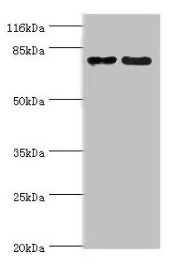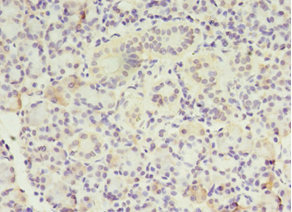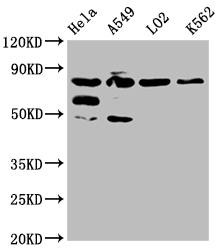Full Product Name
Rabbit anti-Homo sapiens (Human) MTRR Polyclonal antibody
Alternative Names
MTRR antibody; Methionine synthase reductase antibody; MSR antibody; EC 1.16.1.8 antibody
Immunogen
Recombinant Human Methionine synthase reductase protein (1-725AA)
Immunogen Species
Homo sapiens (Human)
Conjugate
Non-conjugated
The MTRR Antibody (Product code: CSB-PA890659EA01HU) is Non-conjugated. For MTRR Antibody with conjugates, please check the following table.
Available Conjugates
| Conjugate |
Product Code |
Product Name |
Application |
| HRP |
CSB-PA890659EB01HU |
MTRR Antibody, HRP conjugated |
ELISA |
| FITC |
CSB-PA890659EC01HU |
MTRR Antibody, FITC conjugated |
|
| Biotin |
CSB-PA890659ED01HU |
MTRR Antibody, Biotin conjugated |
ELISA |
Purification Method
>95%, Protein G purified
Concentration
It differs from different batches. Please contact us to confirm it.
Buffer
Preservative: 0.03% Proclin 300
Constituents: 50% Glycerol, 0.01M PBS, PH 7.4
Tested Applications
ELISA, WB, IHC
Recommended Dilution
| Application |
Recommended Dilution |
| WB |
1:500-1:5000 |
| IHC |
1:20-1:200 |
Storage
Upon receipt, store at -20°C or -80°C. Avoid repeated freeze.
Lead Time
Basically, we can dispatch the products out in 1-3 working days after receiving your orders. Delivery time maybe differs from different purchasing way or location, please kindly consult your local distributors for specific delivery time.
Description
CUSABIO uses the recombinant human methionine synthase reductase (MTRR) protein (1-725AA) to immunize rabbits to generate the anti-MTRR antibody. The resulting antibody is a polyclonal antibody and exists as an unconjugated IgG. It is purified by protein G and reaches up to 95% in purity. It only shows reactivity with human MTRR protein, which is required for activation of methionine synthase and plays a key role in methionine and folate homeostasis. And this MTRR antibody is suitable for the detection of MTRR protein in ELISA, WB, and IHC applications.
Usage
For Research Use Only. Not for use in diagnostic or therapeutic procedures.









